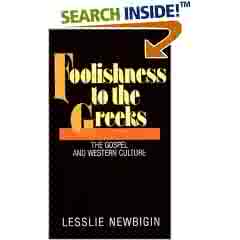 The other day I was reflecting on the various individuals who have influenced my perspective on missions in the West and it occured to me that two very interesting and important insights were born out of missions experiences in India.
The other day I was reflecting on the various individuals who have influenced my perspective on missions in the West and it occured to me that two very interesting and important insights were born out of missions experiences in India.The first important influence comes from Lesslie Newbigin. Newbigin is now infamous in mission circles for coming back to his native UK after serving as a missionary in India, only to find that the UK had become a major mission field itself in his absence. As a result of his observations abroad and at home, Newbigin wrote a number of insightful books and articles, including "Can the West Be Converted?" from the International Bulletin of Missionary Research. Newbigin's thought was, and continues to be, groundreaking. As Alan Roxburgh has stated, Newbigen recognized that, "The greatest challenge to Christian mission was now those very nations that had once sent missionaries around the world." In addition he also explored through his writings a theology of culture and ecclesiology informed by the insights of missiology. Newbigin's thinking continues to influence a number of Christians in the West, and he has been especially influential in the emerging church movement.
 Another missionary with mportant missional insights for the Western world was Donald McGavran, known for work that helped launch the church growth movement. McGavran's insight was the recognition that churches planted by Western missionaries in India were mission stations rather than indigenous expressions of the gospel in local culture. Thus, these churches became "mission station" churches which were bastions of Western Christianity, culturally disconnected from the local populations, rather than indigenous people movements that drew upon aspects of local culture in the formation new expressions of church community. McGavran discussed these issues in his important book The Bridges of God (World Dominion Press, 1955).
Another missionary with mportant missional insights for the Western world was Donald McGavran, known for work that helped launch the church growth movement. McGavran's insight was the recognition that churches planted by Western missionaries in India were mission stations rather than indigenous expressions of the gospel in local culture. Thus, these churches became "mission station" churches which were bastions of Western Christianity, culturally disconnected from the local populations, rather than indigenous people movements that drew upon aspects of local culture in the formation new expressions of church community. McGavran discussed these issues in his important book The Bridges of God (World Dominion Press, 1955).These two individuals might be regarded as missional visionaries. Their thinking remains important and relevant to mission in the West and American post-Christendom. To connect the dots of relevancy to the twenty-first century Western church, Newbigin reminds the great missionary-sending nation of America that cross-cultural missions must also take place in our own neighborhoods. Missions is not just "over there;" more than ever it is "over here." With the shift in the center of gravity of Christianity to the Southern Hemisphere, Western Christianity might also reassess its contribution to world missions in this century.
The insight of McGavran should serve as a wake up call that just as the Western missionary church in India was culturally inappropriate in the local cultural context, so are most of our churches in America, whether Purpose-Driven, seeker friendly, Willow Creek, or whatever the model. Our forms of church subculture are foreign to the neotribal peoples (in terms of social identity) and subcultures of America, hence the need to be truly missional in the development of ecclesiological forms in this country.
As I continue to reflect on the insights of these missional thinkers I find it interesting that God gave these men important insights while they served cross-culturally in India. Their work serves as another indication of the immense value and application of cross-cultural missiology to Western Christianity in our changing cultural context.
1 comment:
Jonny Baker has put up a few exerpts and comments from "The Christ of the Indian Road". www.jonnybaker.blogs.com/jonnybaker/
Prescient writing from that author too.
Dana Ames
Post a Comment